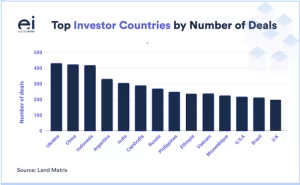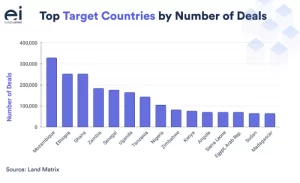As Africa’s real estate sector continues to grow, land acquisition especially has seen increased investor interest from both domestic and foreign buyers. According to land matrix, investors ranging from China, UK, Ukraine, Gulf region and even Mozambique have collectively transacted in over 2.7 million land deals recorded across Africa since the year 2000.

Notably, countries such as Mozambique, Ethiopia, Ghana and Zambia have featured at the top of the pyramid with the largest amount of land sold to foreign investors as indicated in the figure below.

While land is extremely cheap in the majority of African countries, the informal nature of the land system sometimes impacts on the land ownership process. In the majority of the rural areas, for example, land sales are mainly done by the owners, family members or chiefs with documentation rare in some places.
In this article, we highlight five key things buyers need to know when purchasing land in African countries.
Conduct due diligence
This involves the physical verification of the existence of the land as well as conducting a land search to check for any encumbrances on the land such as potential mortgages or disputes on the said land.
Compare the price with the surrounding areas
Typically, land value is expected to increase over time. However, anecdotal evidence in multiple cities suggests that speculation on land and additional factors such as money laundering have resulted in the value of land in some areas being skewed. As a result, investors are likely to invest in overvalued land that will ultimately impact their return on investments.
Estate Intel’s Land Dashboards, seek to address this challenge by providing you with an overview of land values over time in select areas across multiple countries.
Understand the Zoning
Depending on the location of the land, zoning laws might present future obstacles for you. This is because they often restrict the usage which might affect the course of actions that you would like to fulfil on the purchased land.
Check for provision of ancillary infrastructure
As part of large-scale acquisitions or within master-planned developments, an investor should check if utilities are accessible or if there are any existing issues in terms of the supply of utilities such as water and electricity. They should also consider long-term plans around the developments such as proposed government developments that might result in compulsory acquisition.
Understand the nature of tenure
Land tenures across Africa vary significantly. In countries such as Angola, Mozambique, Nigeria, and Tanzania the state is considered the sole property owner. As such, individuals cannot own land per se, but can purchase a 99-year lease for it. On the other hand, in Kenya, rural land is largely freehold in nature while urban land is leasehold in nature. In other countries such as Zimbabwe, foreign investors are all but prohibited from making new purchases of land, you must lease the land from a Zimbabwean citizen or at least co-own it with him/her. While in others, like South Africa, the land ownership process is straightforward for expats to own real estate there.
Overall, consulting with the right team is critical to making the right investment.
































